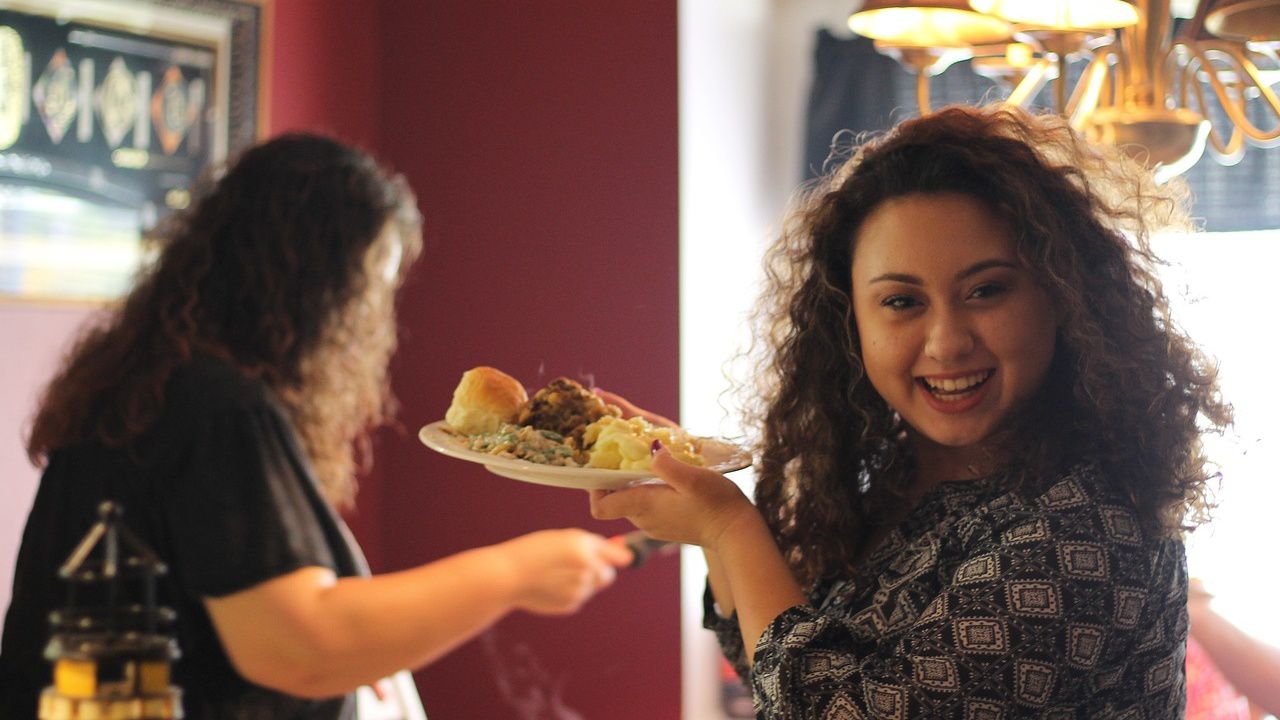Editor's note: This story was originally published on Nov. 15, 2016.
NEW YORK (AP) — Thanksgiving is traditionally a day for gathering with your family and eating turkey, but there’s a twist on the holiday as a purely social gathering, and it’s called Friendsgiving.
The menu might include anything from beer and cheese fries to cocktails and salmon. But instead of the host slaving away for hours in a hot kitchen, it’s more likely to be a party-style potluck.
And while Americans have long celebrated Thanksgiving with friends when they couldn’t be with family — whether they were living abroad, at college or in the military — Friendsgivings aren’t usually replacements for traditional family gatherings. Instead, Friendsgivings are held in addition to the traditional Thursday turkey dinner, specifically scheduled on a different day so as not to conflict with family get-togethers.
New Yorker Hannah Redfield says she and her 20-something friends are “really into” Friendsgiving, which they’ve celebrated since 2014. She calls it “a millennial-driven interpretation of Thanksgiving. This demographic of people isn’t as concerned with preparing the traditional Thanksgiving meal but is looking for an excuse to celebrate friendship. In my experience, people aren’t necessarily expected to show up with solely mashed potatoes, stuffing, cranberry sauce, etc.” Instead, they bring everything from cheese fries to spaghetti squash — “whatever they could muster or afford with entry-level salaries.”
Nina Foley of Chicago agrees that Friendsgivings offer an opportunity to break traditions: “While a family Thanksgiving would never allow for anything other than traditional canned cranberry, creamed corn casserole or green beans, because it’s Friendsgiving, we have the freedom to get creative.” One friend in her group went to culinary school and includes ingredients with his gourmet turkey that “none of us ever saw on our plates as kids — figs, preserved oranges, fried sage!”
Friendsgivings are also often more like parties than staid sit-down dinners. There are Friendsgiving pajama parties, and themed events with arts and crafts or games.
Michelle Platt is hosting her third Friendsgiving this year — a potluck — in Briarcliff Manor, New York, for friends from college who are now in their 40s. “We almost all have kids, so I hire a babysitter to watch them so we can have some adult time,” she said.
Platt uses the online invitation service Evite for her Friendsgiving and noted that “the first year was slim pickings for invite designs, but now there are a lot to choose from.” Evite reports a 29 percent increase this year over last in the number of events that its Friendsgiving designs are being used for, totaling in the thousands.
Some Friendsgivings double as fundraisers, with hosts inviting guests to support a good cause. A charity called No Kid Hungry, which focuses on ending childhood hunger by connecting kids to the meals they need, offered a Friendsgiving fundraising option last year and raised $28,000 from some 50 participants. This year, No Kid Hungry has registered 1,400 Friendsgiving fundraisers, raising $78,000 so far. Hosts ask guests for donations or charge for a specific cocktail or treat.
Kory Stamper, associate editor for Merriam-Webster, says the term “Friendsgiving” hasn’t yet made it into the company’s dictionary, but “it’s a good candidate for future inclusion.” She says Friendsgiving started being used around 2007, with boosts from a 2011 Bailey’s Irish Cream ad and also from a “Real Housewives of New Jersey” episode.
Branding expert Nancy Friedman said on her blog, Fritinancy, that Friendsgiving first turned up online in 2004 and was popularized in part by a 2013 Taco Bell promotion. Some people think the term is connected to the TV sitcom “Friends,” which was famous for its annual Thanksgiving-with-friends episodes, but Friedman doesn’t think the word was ever used on the show, which ended in 2004.
Danielle Paleafico, 29, started hosting Friendsgiving five years ago in one of her first apartments after college, and now it’s grown into an all-day, drop-in event for 30 to 40 friends at her home in Morristown, New Jersey.
“We watch football, I make turkey, all the usual side dishes, homemade pasta and meatballs, dessert, etc.,” she said. “Everyone usually brings a dish and a bottle of wine or beer and we all just come together casually, watch the games, catch up and enjoy each other.”
Timing is important: She picks a date before the real Thanksgiving, and then “we all go our separate ways for the holiday and give thanks with our own families.”



